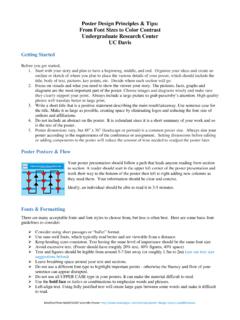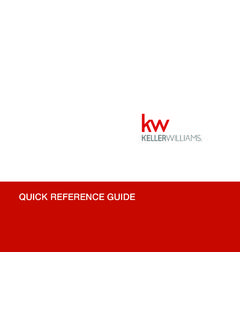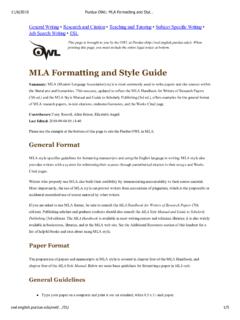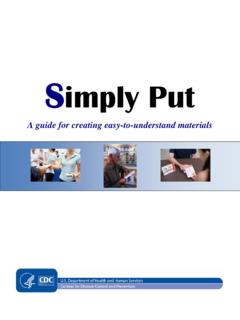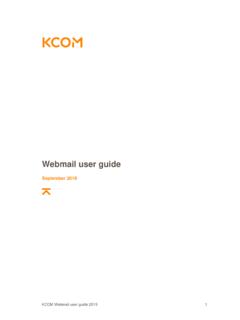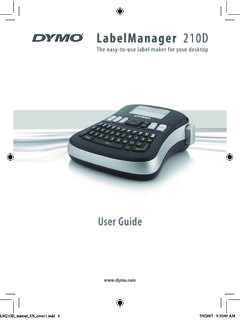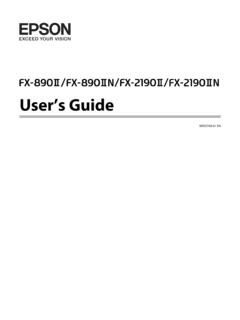Transcription of How To Make An Effective Poster
1 How To Make An Effective Poster Matthew Stuckey, PhD(c), MPH(c) Tammy Hoyer Program Coordinator Assistant Director With information kindly provided by Lolita Adkins and Jeremy Foin Poster Presentations Guidelines: The Must Haves What is an Academic Poster ? A form of Academic Expression Summary of Research (5 10. minutes). Visually augmented discussion/interaction At conferences viewers come to you (or you can invite). People search published abstracts Posters may be grouped by field & folks may wander New Information Characteristic Fields Appearance/Content varies by Field or Lab Why are Academic Posters Important? Represents you and you sponsor's research at: Conferences Symposia Hallways Informational Days Demonstrate expertise Demonstrate attention to detail Practice public speaking Learn about most current results in field Deepens understanding of topic Opportunity for teaching and learning Share ideas Create collaborations Vital: Work with Your Sponsor Represents their laboratory They again need to be involved New data available what should be included?
2 Will want to make revisions (several times). Need final approval Preparing Your Poster Keep in Mind: Characteristic sections with expected information Consult rules of conference/rubrics Work in collaboration w/ research sponsor Decide on experiments that will be presented Create a storyboard/plan Visually appealing Primarily image driven but stand alone Simply and tightly written Know what to say for each figure Transitions between sections Practice for your audience KNOW all details of project Master questions Your Audience will be?? Researchers in your field will read even if bad Researchers in related fields easily persuaded to view Previously uninterested passers by can be attracted by a good Poster **You want to attract these people!**. Don't vary content, vary explanation Main Elements of a Poster Title (same as submitted abstract) Do not use illegible fonts like: Name and Campus Brush Script Core Technical Content Use the same font type throughout Abstract your Poster Introduction No smaller than 16 pt.
3 font Results Discussion Literature cites/Resources Acknowledgements Visuals font should be legible fonts like: Times New Roman Arial Garamond Berkeley UC Davis Medium Poster Appearance Make rough plan of your Poster Poster must be stand alone . Will have standard headings (understandable in halls, unstaffed). Poster provides visual aids as Has to have words you talk Word amount varies with field Picture worth 1K words Balance your text and images Carry information with colorful images and figures Estimate space that will be needed . How many experiments reported How many figures needed? What types of figures? How much text to explain Space for text Poster Appearance 36 x48 good for 3 column Unobtrusive/Neutral backgrounds (Proposal or one experiment). White Intro - Can have image of Lt grey existing model, or eye catching Lt beige photo Methods - can be a flow chart Results Figures, Line Graphs common. Discussion Often bulleted Should be Visually Appealing Understand reader gravity.
4 Top left to bottom Left to right Have an obvious flow Headings Numbers Use white space or color frames to organize Poster 's Appearance Which do you prefer? Poster Overview- 36 by 48 . Title: Should be seen from 4-5 Name: in 44 pts., bold feet away. Times New Roman or Department: 40 pts., bold Sponsoring logo Arial, Bold, at 60-80 point text Institution: 40pts., bold Institution Logo Abstract: No more than 250 words Heading: Legible font , bold, 44pts. Heading: Legible font , bold, 44pts. Figure 1: 32 pts, bold Section: Legible font , bold, 36 pts Section: Legible font , bold, 36 pts Heading: Legible font , bold, 44pts. Heading: Legible font , bold, 44pts. Section: Legible font , bold, 36 pts Section: Legible font , bold, 36 pts Figure 2: 32 pts, bold ACKNOWLEDGEMENTS. Legible font , 36 pts., bold REFERENCES. Legible font , 36 pts., bold First Thing First: The Title and Abstract The title of your abstract is very important Abstract Example: Reflect the content of the paper Specific and Succinct Use key words for indexing and for searches 250 Word Max Includes the following: The research question or problem The methods The observations Analysis, assessment and implications Major findings, results and conclusions REVIEW WITH MENTOR.
5 Title Example: Introduction Or Background This is separate from your abstract! State the research question and significance of the study Include related current investigations If you are there, they won't read it so SAY IT! Get viewers interested Reason you chose to study Foundation for your work (Models). General topics to specific Equivalent to 1 double spaced 12 pt page Usually contain citations/references (cite!). May have Purpose and Hypothesis embedded Generally completes first column Purpose and Hypothesis Can be embedded in Introduction, but Sometimes a separate section, to emphasize Purpose or Objective, Aim, Goal, etc., Why you did experiment? The purpose of this project . Good for Student Conference (Promotes solid judging). Hypothesis Same as for abstract Methods Describe procedures and methods in detail to allow observer to understand how, when, where data was obtained. Describe challenges and lessons learned Text with subheadings Can include a flow chart to summarize May include citations Make sure to include: subjects experimental design drugs and equipment used statistical methods why you chose the method Results Largest section Vary with field Often two middle columns Summarizes the data and reports results of statistical tests and analyses (- or +).
6 Draw implications and considerations Don't present raw data Make Image-based; use few words Maximize use of Figures Make them simple Must be easily seen Make all lines wide enough All text large enough! Consistent axes across Poster Minimize use of tables Difficult to grasp quickly Use figure legends/captions as text Put text near figure it's describing ~1 paragraph per image/image group Conclusions/Discussion Or discussion or summary Very few words Bullets good Bigger font if needed *Summarize take home results Interpret the meaning or implications of your results Mention any alternative explanation for results or unanticipated results *How did hypothesis work out? *Tie back to real world problem *Why Important/Implications Aim for: Reasonable conclusions were given and strongly supported with evidence Conclusions were compared to hypothesis and their relevance in a wider context was discussed References/ Literature Cited Include sources/resources that supported your work If someone's work is cited (usually in introduction), you must include a reference Generally short (title optional).
7 Can use smaller font if needed Acknowledgements Acknowledge the faculty and staff who supported you. Thank people Mentor Research group Technical assistance, etc. Reveal possible conflicts of interest Identify funding utilized CAMP, LSAMP-NSF, NIH, etc. font can be smaller than rest of text Remember to check that: All expected components are present, clearly laid out, and easy to follow in the absence of presenter The text is concise, legible, and consistently free of spelling or typographical errors; the background is unobtrusive The figures and tables are appropriate and consistently labeled correctly Photographs/tables/graphs improve understanding and enhance the visual appeal For ideas can go to Pimp My Poster : Examples of Excellent Posters Examples of Excellent Posters Practice Makes Perfect Finish early enough to practice MAKE SURE TO PRACTICE! Develop 5 minute presentation Know first sentence What to say for each figure (3 pts ). Transitions between figures What to point at for each figure Practice with lab mates and laypersons Run through ENTIRE Poster Be friendly Don't sound like you've memorized Be excited about your work Remember to refer to your Poster !
8 They may interrupt with questions Pause long enough for them look at figure Know what questions may be asked . Can practice them First Contact Stand to left of Poster (where start reading). Take initiative Smile, but stay near Poster If they come closer Say, Hello and shake hands Give name. Get their name. Give level, and university (UC Davis). Ask if they'd like you to walk them through your Poster . YES? Then GO! This is work that I performed this summer in the ___ program in the laboratory of Dr. _____ at UC Davis. (Optional) Ask if they are familiar with this field of research No- More introduction, careful with acronyms Yes- Can go more quickly through intro The Flow of Things Start with Intro that will catch them No pointing if you have no figure! Move to Methods Briefly summarize Move to Results Longest section Indicate at beginning if did not work Walk thru all figures Transition to Conclusions Say Conclusions Acknowledgements (optional). Any Questions? The Just in Case Items: Carry your Poster with you at all times (do not leave as checked baggage).
9 Dress for situation Follow culture of conference Student conference suit or minimally khaki's Comfortable shoes Be there on time! Don't leave unless it is very important to do so (if so, leave a friend there momentarily). Mini- Poster printed out Pins Water Business cards (check your email!). Notebook Networking write down ideas and names! Remember If you network please remember to email them! Keep promises that you've made Hang Poster outside your lab Sample posters can be seen online google search A template can be found at: References and Sites to Visit How to Write an Abstract: How to Present: Click here for PosterTalk helpful presentation, which was used to create parts of this presentation. Thank you Dr. Gail P. Taylor! Or visit: ;_ylu=X3oDM. TByNzhwY2hkBHNlYwNzcgRwb3 MDMgRjb2xvA2dxMQR2dGlkAw-- /RV=2/RE=1419913218/RO=10/RU=http%3a%2f% s%2fresources%2fcourses%2frescar% dne73Y6qpS9cTFIPF8_0- Colin Purrington: Advice for designing scientific posters. Knowledge Management in Health Services; HSERV 590A: Creating a Poster Using MS PowerPoint University of Washington ~hs590a/ Creating Effective Poster Presentations Hess and Liegel.
10 ~grhess/posters/. University of Buffalo- Designing Effective Poster presentations University of Kansas- Jeff Radel GOOD LUCK ON. YOUR POSTERS!!
